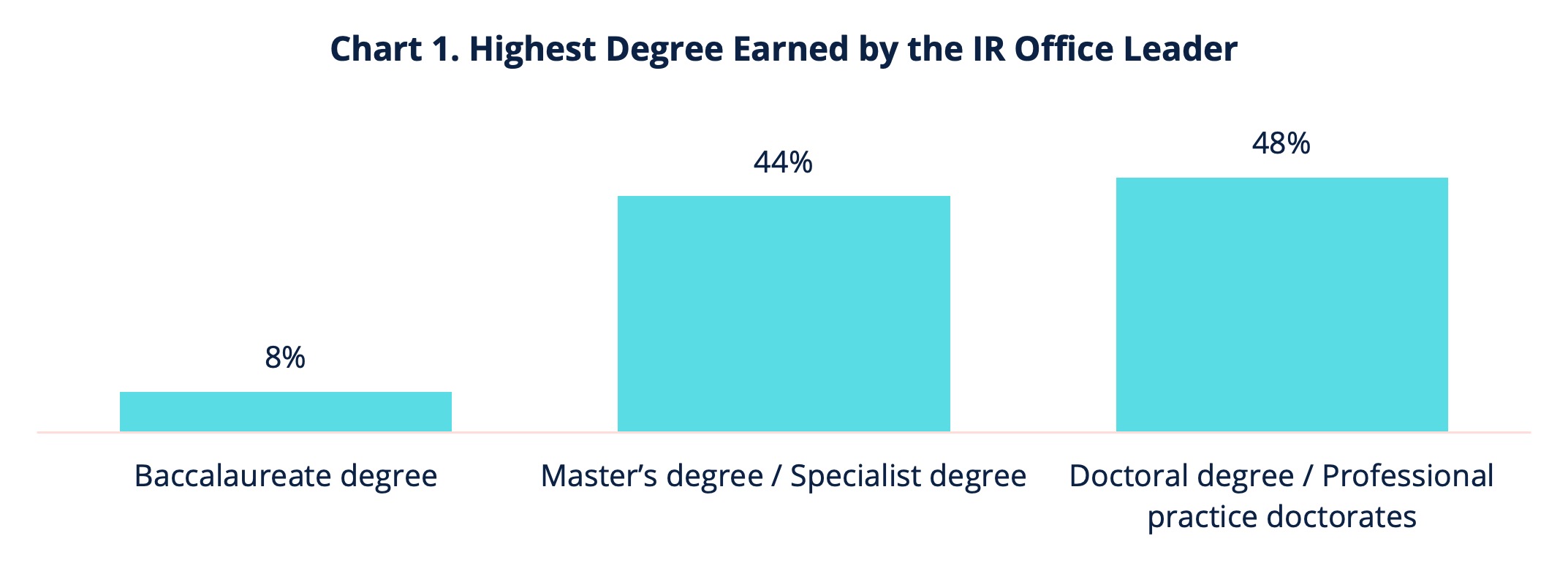IR Office Leader Characteristics
This brief is one of a series of reports. Learn more at airweb.org/nationalsurvey.
Institutional research (IR) leaders have myriad responsibilities beyond leading the work of their units, including hiring and training new staff, managing staff, and communicating the value of their offices’ work to stakeholders and senior leaders. Many who work in IR started their careers on completely different professional trajectories. In the 2018 AIR National Survey of IR Offices, we asked IR office leaders about their educational and professional backgrounds to explore their characteristics as a group.
Office Leader Academic Degrees and IR Certificates
Required credentials for IR office leaders vary by the institution and the responsibilities they hold. Survey data reveal that more than 90% of respondents have earned master’s degrees or beyond (Chart 1).

When we disaggregate the data by major institutional sector1 (i.e., public 4-year, public 2-year, and private not-for-profit 4-year), we find that slightly more IR office leaders at public 4-year institutions hold doctoral degrees than office leaders at public 2-year institutions (Table 1).
| Highest Degree Earned | All Institutions (n = 539) | Public 4-year (n = 253) | Public 2-year (n = 123) | Private NFP 4-year (n = 163) |
|---|---|---|---|---|
| Baccalaureate degree | 8% | 10% | 8% | 6% |
| Master’s degree/Specialist (e.g., M.A., M.S., Ed.S.) | 44% | 39% | 47% | 46% |
| Doctoral degree including professional practice doctorates (e.g., Ph.D., Ed.D., M.D., J.D.) | 48% | 51% | 45% | 48% |
Of the IR offices included in the 2015 and 2018 National Surveys, 339 provided information on the IR leaders’ highest degrees earned. Between 2015 and 2018, the percentage of leaders with postgraduate degrees at those 339 institutions rose, including an increase in doctoral degrees (Table 2).
| Highest Degree Earned | 2015 | 2018 |
|---|---|---|
| Less than a Baccalaureate degree | 1% | 0% |
| Baccalaureate degree | 10% | 7% |
| Master’s degree/Specialist (e.g., M.A., M.S., Ed.S.) | 47% | 44% |
| Doctoral degree including professional practice doctorates (e.g., Ph.D., Ed.D., M.D., J.D.) | 42% | 49% |
Several U.S. institutions offer post-graduate certificates in IR that provide specialized, field-specific training as a supplement to or in lieu of postgraduate studies. Data from the 2018 National Survey show that 9% of office leaders have IR certificates; that number is consistent across institutional sector.
Relevant Work Experience
Because there is no specific degree program related to IR, it is important that office leaders have relevant or transferable experience sufficient for their roles, such as (but not limited to) other higher education fields. On average, IR office leaders have worked nearly 18 years in higher education, 6 prior to entering IR, and 11 years in fields related to IR or institutional effectiveness (IE). Further, respondents reported, on average, working 10 years at their current institutions and 6 years leading the IR offices at those institutions.
When we disaggregate by major institutional sector, we find that IR office leaders at public 4-year institutions have slightly more work experience in higher education and IR/IE than office leaders in other sectors.
| Work Experience | All Institutions | Public 4-year | Public 2-year | Private NFP 4-year |
|---|---|---|---|---|
| Working in higher education regardless of institution | 17.8 | 19.1 | 16.6 | 17.5 |
| Working in the IR/IE field regardless of institution | 11.4 | 13.3 | 10.6 | 10.6 |
| Working at current institution | 10.4 | 11.6 | 9.5 | 10.1 |
| Leading the IR/IE office at current institution | 6.1 | 6.4 | 5.7 | 6.2 |
Of the IR offices included in the 2015 and 2018 National Surveys, 309 provided information on IR leaders’ relevant work experience. Between 2015 and 2018, IR office leaders have 1 year more experience in higher education and IR/IE, including a 6-month increase in experience at their current institutions.
Methodology
The 2018 AIR National Survey of IR Offices attempted to survey IR office leaders at more than 3,000 postsecondary degree-granting institutions. Institutions of all sectors, types of control, and sizes were included in the sample. In total, responses represented 1,167 institutions, and 566 of those institutions completed the survey in full. To ensure comparable results, incomplete responses are excluded from this report. In addition, responses from for-profit institutions, administrative units, international institutions, private not-for-profit 2-year institutions, and institutions in U.S. territories are excluded due to low response rates.
This Report
The findings presented in this report are based on 543 responses that represent U.S. postsecondary, degree-granting institutions at public 4-year, public 2-year, or private not-for-profit 4-year institutions.
- See methodology section at end of this report for more information.
Related Content
2018 AIR National Survey of IR Offices: Topic Briefs
